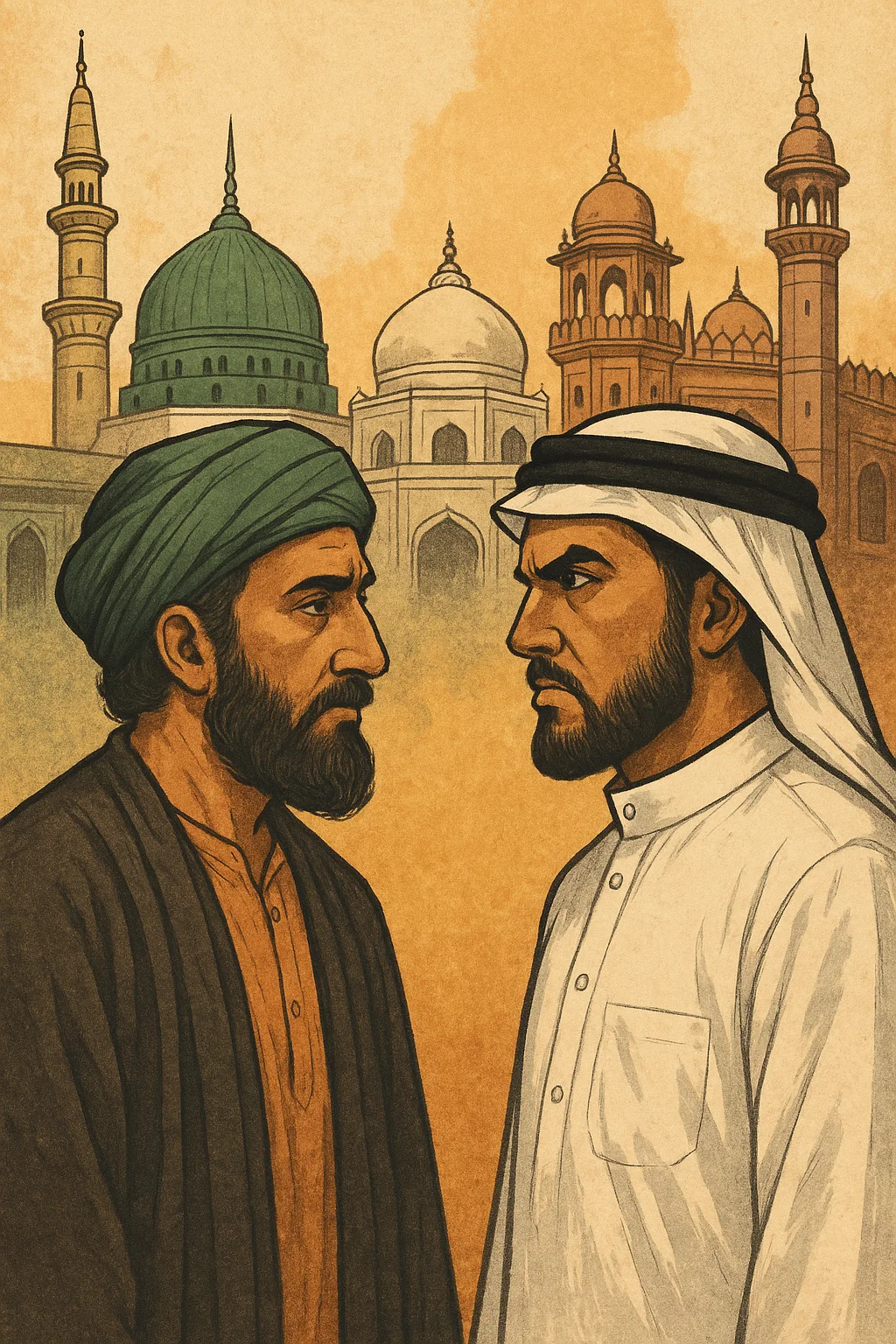Reading time : 2 minutes
(Dr. Shujaat Ali Quadri)
For centuries, Islam in South Asia, Persia, Africa, and the wider Muslim world thrived as a civilisation of diversity different legal schools, theological traditions, local cultures, and spiritual lineages coexisted within a broad umbrella of shared faith. This pluralism was not a weakness; it was Islam’s greatest intellectual strength. Yet over the last two centuries, an aggressively so called puritanical movement Wahhabism has tried to turn this plural, lived faith into a rigid identity project defined by binaries: “true Muslims” versus “deviants.”
This transformation did not emerge organically from Muslim societies. It was carefully manufactured, both ideologically and politically, and its effects today from sectarian hate to the policing of cultural practices reveal how Wahhabism turned religion into a battlefield of identity purity tests.
Classical Islam distinguishes between the inner (batin) and outer (zahir) dimensions of faith. The heart matters as much as the ritual. Scholars disagree respectfully. Cultures shape practice. Saints (Sufis) guide communities. Wahhabism, however, arose in 18th-century in Modern day Saudi Arabia by rejecting this diversity in favour of an uncompromising, literalist reading of scripture. Its founder, ibn Abd al-Wahhab, declared many long established Muslim traditions, visiting graves of Pious people, celebrating the Prophet, Sufi practices, local customs as “innovations,” even equating them with polytheism.
This was not just a theological argument it was an identity movement:You are a Muslim only if you follow a narrow set of rituals. Anyone outside that definition is not merely wrong, but suspicious, deviant, or even an enemy. The entire Muslim world had to be “purified,” culturally and spiritually. This sharp division, previously alien to most Muslim societies, became the foundation of a puritan project.
Now Lets see how Wahhabism Turned Religion Into Purity Tests, Wahhabism elevates a shallow literalism above the centuries of scholarship that shaped Islamic civilisation. This allows its preachers to label whole communities as bid’ati (innovators) or grave worshippers, without understanding context, history, or spiritual symbolism. A simple cultural act like singing devotional poetry (Qawwali or Sima’h) can suddenly become evidence of “corruption.” This narrow definition of faith becomes a litmus test of identity, not spirituality.
From South Asia to Africa, Islam absorbed local customs, languages, poetry, and artistic forms. Wahhabism declared these “un Islamic,” enforcing a uniform desert culture as the only legitimate expression of Islam. The result? A Bengali Sufi poem, a Sindhi qawwali, a Moroccan chant, Turkish Zikr are all dismissed not for any moral violation, but for not fitting into a fabricated purity box.
To maintain purity politics, there must always be a “corrupted other”:Sufis are accused of shirk. The Sunni majority is told it has fallen into “grave worship.” Women who don’t follow specific Wahhabi dress codes are shamed. Minor cultural variations become theological crimes. This creates a perpetual identity war within the Muslim community, serving political, not spiritual, interests.
The 20th century oil boom enabled Wahhabi ideology to be exported globally through textbooks, scholarships, mosque funding, and media. This fossil fuelled missionary project amplified identity-based purity tests across continents. Young Muslims from Cairo, to Delhi to Kuala Lumpur were suddenly taught that their own grandparents were practicing a “corrupted Islam.” This manufactured inferiority complex broke the continuity of cultural Islam.
In Wahhabi thinking, visible conformity dress, slogans, gestures becomes the ultimate marker of piety. Spiritual honesty, compassion, ethics, humility core Islamic values take a backseat to outward symbolism. Purity tests thrive because they’re easy to perform and easy to weaponise.
The rise of Wahhabi style identity policing has produced damaging consequences: Sectarian divisions that previously did not exist. Mistrust within families and neighbourhoods, Cultural alienation among young Muslims, Hostility between traditional Ulema and imported preachers, A decline in spiritual depth, replaced by angry rhetoric. This is the politicisation of faith: when identity becomes more important than ethics, when uniformity replaces unity.
The antidote to Wahhabi purity politics lies in returning to Islam’s rich heritage of pluralism, Recognising four Sunni Madhabs, Sufi Tariqas (Sufi Orders), and diverse cultures, Celebrating local traditions that reflect Islam’s adaptability, Restoring respect for saints, scholars, and community elders, Teaching the ethical core of Islam, not just ritual rules, Reviving Sufi spiritual education that emphasises love, humility, and service, Faith must be reclaimed from those who turned it into an ideological machine.
Wahhabism did not “purify” Islam but politicised it. It turned a civilisation into an identity, then turned that identity into a weapon. Its purity tests are artificial constructs designed to control, not to enlighten. The Muslim world stands at a crossroads. Either we remain trapped in the binaries of “true vs deviant,” or we reclaim Islam as a broad, plural, compassionate faith that embraces difference instead of condemning it.
The future of Muslim identity depends on rejecting manufactured purity and returning to authentic spirituality.
(The Author is the National Chairman of Muslim Students Organisation of India MSO, he writes on a wide range of issues, including, Sufism, Public Policy, Geopolitics and Information Warfare.)

